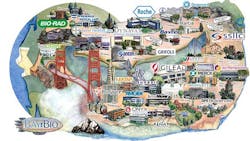If You Build It, They Will Come: Industrial Clusters Fuel Economy
The theory of locating similar companies in a centralized place in order to stimulate economic growth works, according to a new study from MIT.
The study shows that clusters of almost all kinds help drive overall economic growth in multiple ways, from job creation and development of intellectual property to the formation of new industries, reports Peter Dizikes at MIT.
The study, author by Scott Stern, at the MIT Sloan School of Management, Mercedes Delgado, at Temple University’s Fox School of Business, and Michael Porter of Harvard’s Business School, examined 41 industrial clusters, 589 different subfields of industry, and 177 regions in the U.S.
Stern comments on the study:
Very often, regions are given advice that they should become the next Silicon Valley, or be like some other region. They’re told that they’re in a global war for talent, or they should try to put out very expensive incentives to attract a single plant. What our research suggests is that regions succeed by investing in and extending their comparative advantage.
We see more innovation in strong clusters, and strong innovation clusters are also associated with stronger employment. So there’s a duality between the innovation and the jobs.
More on industrial clusters on MIT News.
